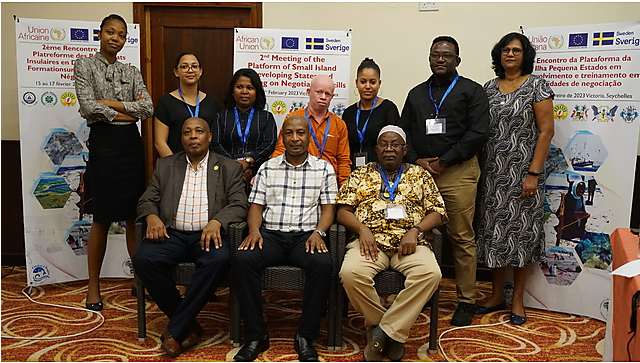
African Union-Inter African Bureau for Animal Resources (AU-IBAR) in collaboration with African Union Development Agency (AUDA-NEPAD) through the EU-funded phase two of the Fisheries Governance Project (Fish Gov 2) and SIDA-funded Conserving Aquatic Biodiversity Project organised a 2nd meeting of a platform of Small Island Developing States (SIDS) and training workshop on negotiation skills.
Continue Reading
There has been an acknowledged need for capacity building of African Union Member States as an accepted development theory in decision-making and participation in International Ocean negotiations. AU-IBAR and AUDA-NEPAD jointly organised the second meeting of the Small Island Developing States (SIDS) Platform and training in negotiating skills in Seychelles from 15 to 17 February, 2023 in response to the need for improved negotiating skills and participant recommendations from the last SIDS meeting held in August, 2022.
The absence of active engagement in International Ocean negotiations by African Nations is indicative of the skills gap in negotiation. Some Countries have failed to approve or execute International Instruments. The capacity of Governments to implement important International Agreements and Africa's voice must be reinforced. The consolidation of collaboration and coordination mechanisms, effective participation, and articulation of a unified African voice in Global fora such as climate change and Ocean governance require improvement.
Continue Reading
AU-IBAR (the African Union Inter-African Bureau for Animal Resources) is currently implementing the second phase of the Fisheries Governance Project (FishGov2) which aims to enhance the contribution of its member states towards sustainable fisheries and aquaculture in order to achieve its objectives set out in the AU Agenda 2063. The projects are funded by the European Union (EU) and the Swedish International Development Cooperation Agency (SIDA) respectively.
Some of the specific objectives of the project is to ensure that Africa represented and effectively participates in international fisheries and aquaculture fora.
In order to achieve that, AU Member States, including SIDS (Small Island Developing States), must have the capacity to negotiate on international level and there needs to be a mechanism in place to coordinate African common positions with several activities including:
· The identification of specific needs of African SIDS and Madagascar and that these are into account in international fora and
· The enhancement of capacities on international issues and organization of specific training for pre-identified negotiators.
Hence, the AU-IBAR is organizing the 2nd Meeting of the African SIDS Platform and Workshop from the 15th February 2023 to the 17th February 2023 in Seychelles.
Additionally, the workshop seeks to consolidate the outcomes and recommendations of the first meeting that happened in August 2022 and to chart the way forward for strategic positions to ensure increased contribution to food and nutritional security, poverty alleviation and economic growth consistent with the Malabo Declaration that called for action on transformation of African agriculture by 2025.
Other specific objectives of the workshop includes:
In the above regards the FishGov2 and Biodiversity Projects with funding from EU and SIDA will co-organize the meeting in Seychelles with the following key objectives to:
· Consolidate the outcomes and recommendations of the first meeting of the AU-SIDS Platform and chart the way forward for strategic positions;
· Enhance the capacities of AU-SIDS and other pre-identified negotiators - in terms of international negotiations;
· Formulate a mechanism to coordinate African common positions and enhanced African voice at Global Fora for fisheries, aquaculture, aquatic biodiversity, environmental sustainability and climate change related regimes;
· Enrich and validate the final report of the consultancy on Identification of specific issues relevant to Small Island Developing States (SIDS) and draft strategic positions and recommendations for the establishment/strengthening a platform of Small Island Developing States (SIDS);
· Enhance awareness and build capacity among stakeholders on the importance of the various regimes, relevant provisions, challenges and mechanisms for effective role and participation in global regimes;
Estimated 35 invited participants to the Workshop would comprise of delegates representing Seychelles, Mauritius, Comoros, Cape Verde, and Sao Tome & Principe including Madagascar; Southern African Development Community (SADC); Regional Projects in Fisheries, Aquaculture and Blue Economy; Regional Sea Conventions (RSAs); African Union Centres of Excellence in Fisheries and Aquaculture (AU-COEs); Experts (Trainees and Trainers); AU-IBAR Consultants; Development Partners and relevant staff from the AU-IBAR.
View Full Post and Comments
World Meteorological Organization is warning that Africa is extremely vulnerable to climate change.
By Judith Akolo
The World Meteorological Organisation (WMO) has warned that Climate change continues to strike Africa with extreme weather events. The WMO Secretary-General, Professor Petteri Taalas in a statement says the devastating drought in the greater horn of Africa, including parts of Kenya, Ethiopia, Sudan, and Somalia is manifestation of the impacts of climate change.
“More than 13 million people are facing severe food insecurity in the horn of Africa and the health of 6 million children from these countries is affected by malnutrition,” said Prof. Taalas who spoke during the conference of heads of National Meteorological and Hydrological (NMHSs) in Addis Ababa, Ethiopia, says the failure of five rainfall seasons has had devastating effects of crops and this could impact the harvests.
Prof. Taalas told the meeting attended by Heads of National and Meteorological and hydrological Services, regional and global experts in weather, climate and water services with decision-makers in Africa that more than 3 million livestock supporting the livelihoods of pastoral communities have died in the Region.
He told the meeting that is discussing the need for enhancing digital transformation of the Hydro-Meteorological Services in the Region that digital transformation of the NMHSs “will make accessing severe weather warnings and alerts easy,” he said and added that, “Technology transformation will strengthen and modernize NMHSs to perform their public weather functions for the safety of lives and property.”
The Secretary-General noted that the digital transformation of the Meteorological services in Africa will help fasten data transmission speed “and increase the ability to create products and services for realtime, exchange of information, critical for forecasting and warnings of hydro-Meteorological hazards, so as to warn the public and enhance safety.”
In his remarks, the Ethiopian State Minister for Water and Energy, Dr Abraha Adugna, noted that the frequency and intensity of hazards on the continent is significant adding that the impacts are having pressure in socioeconomic sectors.
Dr. Adugna said that the Ethiopia government in partnership with the Ethiopian Meteorological Institute (EMI) has established a modernized network for collecting meteorological data for early warning services in a bid to improve lives and livelihood.
View Full Post and Comments
Drought situation worsening as livestock mortality continues
By Judith Akolo
The Famine Early Warning Systems Network (FEWSNET) is warning that the drought situation is worsening in the pastoral regions of the country. According to FEWSNET, water sources are drying up in the pastoral areas of Kenya following the end of the fifth consecutive rainy season.
In its February report, the Network indicates that the National Drought Management Authority (NDMA) sentinel sites reports that, “livestock body conditions are getting from largely poor to very poor, with livestock deaths due to the drought continuing to be reported.”
The report indicates that people are traveling on average, three to 17 kilometers to access water, while livestock trek 10 to 33 kilometers due to limited water access. “Livestock milk production, a key source of food and income, remains well below normal, with livestock producing from zero to 0.9 liters per household per day,” says the report on the ongoing drought situation in the Arid and Semi-Arid Lands (ASALs) in the country, and adds, “Overall, the ongoing drought continues to severely hinder household access to food and income, resulting in widespread Crisis.”
According to the report, the marginal agricultural areas of Kitui and Meru counties and in parts of Kilifi and Kwale counties, there are reports of crop failure following the below-average October to December short rains.
“Across the marginal agricultural areas, the maize crop is unlikely to reach maturity following the cessation of rainfall in late December and inadequate soil moisture to support growth,” the FEWSNET report warns.
A below-average harvest of green grams, cowpeas, and beans is also underway in most areas, compounded by the early consumption of green produce, especially beans which means that there could be nothing to harvest, “overall, households remain atypically reliant on market food purchases due to a lack of stocks from the below-average March to May 2022 season.”
The danger is that households are now relying on off-own farm activities such as selling charcoal, firewood, and petty trade to earn income, which could further undermine the quest to plant 15 billion trees by the end of 10 years, this as food prices remain high even as household earnings remain limited.
View Full Post and Comments
Biennial Review reports enhancing agriculture transformation and development in Africa
By Judith Akolo
The African Union Commission (AUC) developed a roadmap for the fourth Biennial Review cycle.
The Director of Agriculture and Rural Development at the AUC Dr. Godfrey Bahiigwa says for the continent to realize the envisaged growth in the agriculture sector there is need to critically analyse the previous three Biennial Review cycles.
Speaking when he opened a four-day Training of Trainers meeting on the revised Comprehensive Africa Agriculture Development Program (CAADP), Biennial Review reporting tools at a Nairobi hotel, Dr. Bahiigwa said that a re-examination of the “difficulties and issues encountered in the coordination of the Biennial Review process, data collection and quality, a review of the new indicators to be added, updating of the Biennial Review reporting tools and the e-BR,” was important as it has now enabled the directorate have a clear direction on how the Biennial Review cycles can be enhanced in order to realise the envisioned goals.
He noted that the Biennial Review Report is a fundamental instrument that shows outcomes of different agricultural efforts and interventions on the continent. “It enables countries to track, measure and report progress achieved against agreed result areas,” said Dr. Bahiigwa.
The Director said that the critical analysis that was conducted was aimed at addressing the challenges “and thereby improve the next BR cycle,” he said and added that, “Before the commencement of the critical analysis, we made sure that the process was inclusive and owned by all our stakeholders.”
Dr. Bahiigwa noted that the addition of ninth technical working group on communication and advocacy on the Biennial Review process will help to enhance an understanding and knowledge on the process itself and how it can be of benefit to the member states.
“The BR process is a learning process and obtaining quality data has remained a top priority,” he said and called for an improvement in communication and advocacy of the overall Biennial Review process. “During this training, assigned experts will provide sessions not only on indicator profiles but also on data quality and on communication and advocacy, to better inform,” he said.
He told the meeting of Trainer of Trainers drawn from all the regional economic communities on the continent that they will be expected to support the BR process in their Regions and also provide training to member states in order to enable them to carry out the fourth Biennial Review exercise.
Among the areas being addressed in the CAADP Biennial Review and which arise from the Malabo Declaration on Agriculture Transformation include; Halving poverty through agriculture by 2025; Ending Hunger by 2025; Enhancing Investment Finance in Agriculture; Boosting Intra-Africa Trade in Agriculture Commodities and Services; Enhancing Resilience to Climate Variability; Enhancing Mutual Accountability for Actions and Results and Recommitment to the Principles and Values of the CAADP Process.
View Full Post and Comments


